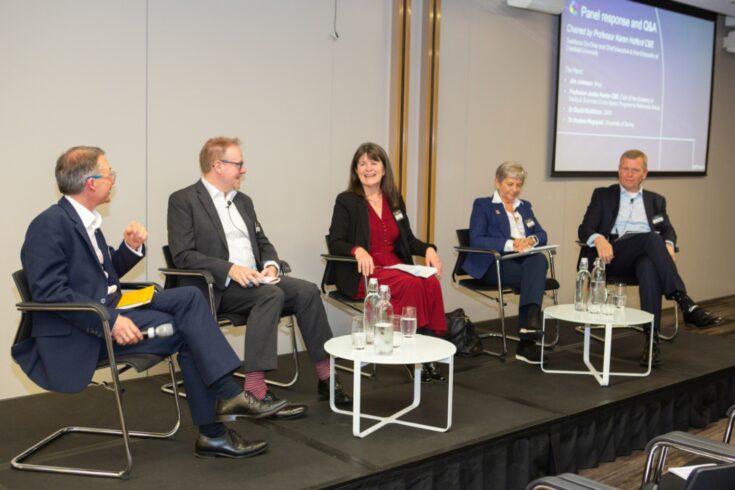A vision for a mobile workforce
When researchers in our innovation workforce move into new roles and positions across sectors, they link networks, increase access to skills and infrastructure, and develop new partnerships.
When this happens at a large scale, researchers are empowered to build exciting, rewarding and impact-focused careers. Universities and businesses can capture the value of a diverse and highly-skilled research community. And the UK as a whole benefits fully from the next industrial revolution, powered by connected and dynamic research that happens at and across the interfaces of all sectors of the economy.
These outcomes, evidenced in the National Centre for Universities and Business (NCUB)’s Researcher Mobility Taskforce, build a strong rationale for a porous research and innovation ecosystem, and for our sectors to be open to talent from all backgrounds.
This taskforce, endorsed by Research England and UK Research and Innovation (UKRI), was delivered by NCUB and co-chaired by Sam Laidlaw and Professor Karen Holford in 2023. It brought together six business and six university leaders to explore the levels of researcher mobility in the UK, demonstrate the benefits, challenges and opportunities, and produce tangible recommendations to deliver against national ambitions within the research and development (R&D) people and culture strategy.

Photo from the launch of the Pathways to Success report in 2023. Credit: NCUB
Levels of mobility in the UK
There is limited data available, but the data we do have suggests that 20.4% of academic researchers have previously worked in the private sector. It finds that in the UK, fewer researchers move sectors than the EU average.
Trends point to key barriers
Across the project’s research, several trends around the career stage that mobility occurs, direction of this movement, and accessibility unearthed both specific and cross-cutting barriers to intersectoral mobility.
When researchers move sectors, this is more frequently into academia from industry than the other way around, and this trend persists across all career stages. Academia has a large pull, with historic reputation, and in places, stereotypes of business culture and purpose harms the appetite of university-based researchers to make the move.
At the middle career stage, mobility is at its lowest. Speaking to researchers to understand why this trend occurs found that researchers in industry often view their careers as highly stable, and are unwilling to disrupt it. They can perceive a move to academia as a more precarious, high-risk prospect.
Others reported facing difficulties in joining or re-joining academia at this time, typically citing a disrupted publication record as a barrier to being hired. Among university-based researchers, across all career stages, there is a correlating and corresponding view that moving into industry ‘closes the door’ on an academic career, believing they would be unable to return. Additionally, university-based researchers at the mid-career stage are generally working towards a permanent professorial role. Time in industry or outside of the sector is seen as adverse to that aim.
Many face an additional barrier of geographic mobility to move roles or sectors. Family and housing ties can limit options, and these pressures are likely to affect some groups more than others, including women and those with caring responsibilities. Removing structural barriers to mobility, and ‘de-risking’ the move, will enable everyone to pursue a diverse career.
Working to unlock increased mobility
To begin to remove these barriers and foster an environment that creates career flexibility, NCUB collaborated with policymakers, delivery bodies, universities and businesses to realise the taskforce’s vision. Since the launch of the project in 2023, great momentum and impact has already been gained.
In the last six months, we actively engaged with universities and businesses through a series of conferences and workshops, supporting and catalysing new approaches. Across the UK, these interactive and engaging events served as arenas for sharing ideas and best practices. They have built momentum and many institutes are forming and expanding initiatives to create opportunities for mobility; from improving entrepreneurial skills in academia, to reviewing contract types.
At the University of Exeter, a new programme is being developed to build business-awareness among researchers, upskilling their entrepreneurial capabilities, providing them with the language to engage with industry partners, and supporting them to pursue a career outside of academia. Spanning out from the University of Liverpool, the Prosper model has been launched nationwide, helping post-docs to consider ‘what next’, and the option to move into industrial roles. These new programmes and approaches are paving the way for increased intersectoral collaboration and mobility.
We worked to improve the measurability of researcher mobility through the development of additional data collection methods. The bi-annual Research and Innovation (R&I) Workforce Survey, delivered by the Department for Science, Innovation and Technology (DSIT), will now build a picture of the sectors that researchers have worked in, and where they intend to move onto. The addition of mobility questions to the survey will enable us to make data more accurate and track progress from 2025, when the next wave of the survey reports.
Recommendations within the spin-out review and the government’s response to the nurse review further build the rationale for researcher mobility. These narratives demonstrate active consideration for enhancing mobility, aligning with our shared goal of fostering university entrepreneurial skills and collaboration.
Looking to the future
Looking ahead, NCUB remains committed to enhancing researcher mobility for a prosperous innovation ecosystem. UKRI’s 101 Jobs – Switching Sectors is a campaign furthering the agenda by demonstrating the valuable role cross-sector careers play in driving national innovation. On an individual level, it will inspire researchers by demonstrating the exciting opportunities a diverse career gives to researchers, telling real-life stories.
It’s clear we need to continue to support our researchers to be active and mobile across sector and discipline boundaries. In autumn, NCUB will track progress against the taskforce’s recommendations, reporting on the evolving volume of researchers moving between sectors and the changing landscape within which this takes place.
If your organisation has been active in this area and is working to enhance researcher mobility, or has a compelling impact story to share, we invite you to reach out and share your story with us by emailing dannielle.croucher@ncub.co.uk




